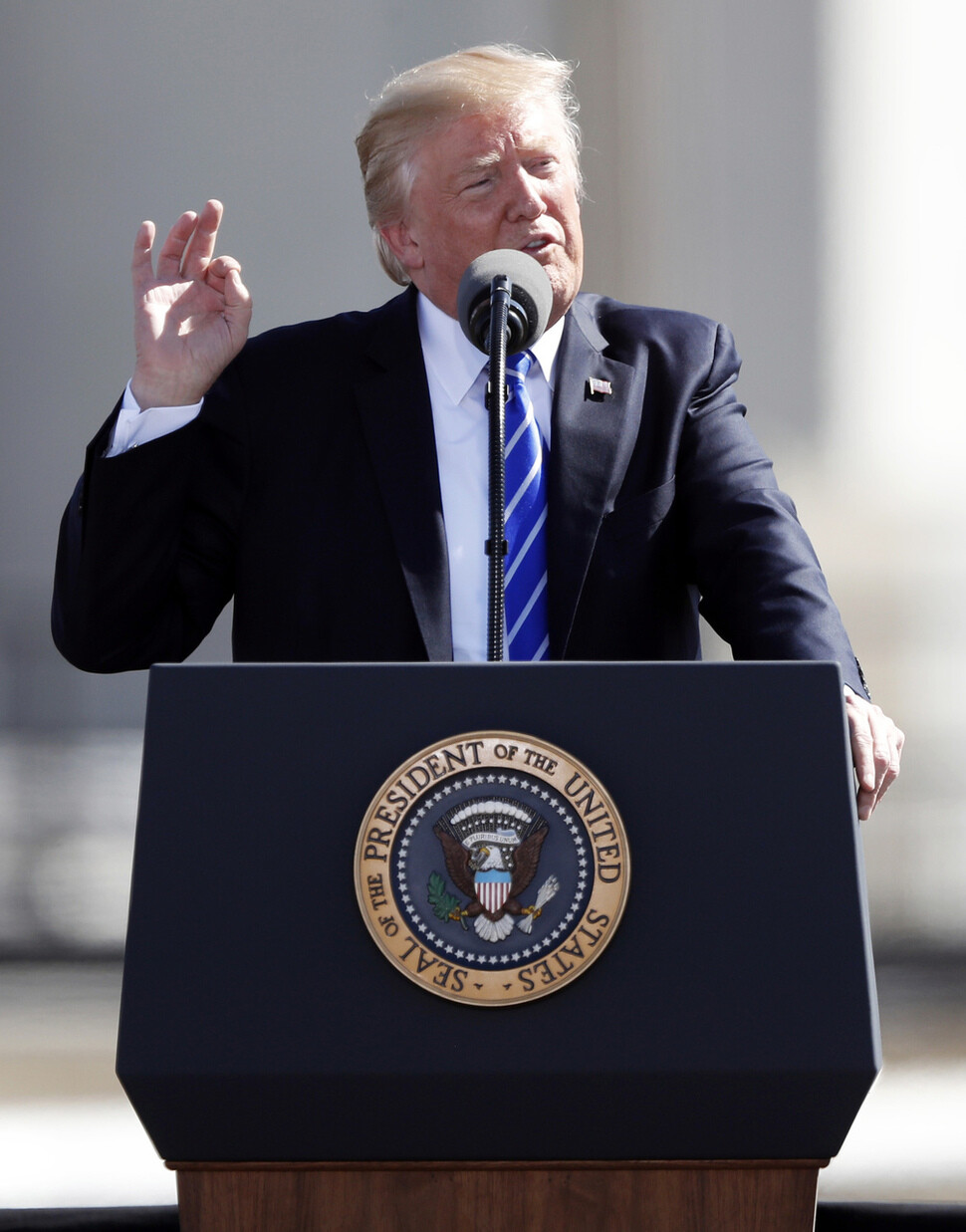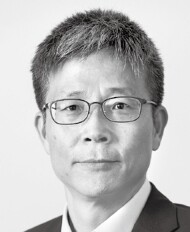hankyoreh
Links to other country sites 다른 나라 사이트 링크
[Column] South Korea needs to draw a line on Trump’s demands

The unilateralism of US President Donald Trump is quite a spectacle. Actually, "unilateralism" is a euphemism in this case; the more fitting term to describe his conduct would be "thuggish." Former President George W. Bush was an aristocrat compared to Trump.
Trump alludes to the termination of the Korea-US Free Trade Agreement (KORUS FTA) as if it's nothing, and pushed for the deployment of the THAAD missile system without any regard to the harmful economic side effects. In his Twitter account, he referred to the Moon administration's policies on North Korea as "appeasement."
Some witnesses have even claimed that Trump didn't hesitate to threaten President Moon at the Korea-US Summit at the end of June. Nobody knows what he said exactly, but well-informed sources say it was a much more severe diplomatic blunder than when George Bush referred to then President Kim Dae-jung as "this man." It seems the only value system he reveres comprises the American empire's military muscle and devious negotiating tactics befitting "The Merchant of Venice."
The Moon administration may have agonized over the decision to deploy the THAAD missile defense system, but this may just be the beginning of the Trump tsunami that's to come. Although it's been drowned out in Trump's overemphasis on issues concerning North Korea and South Korea-US trade, it's highly likely that the Trump administration will make a strong push for security cooperation among Korea, the US and Japan. Given the arrogance he displayed during the THAAD deployment, Trump is bound to apply a great deal of pressure to have his way.
Based on Trump's strategic and military approach to Northeast Asia, his administration seems to be increasingly mimicking the Obama administration's "pivot" to Asia. At the head of this effort is a trio of ex-military leaders: James Mattis, the Secretary of Defense; John Kelly, the White House Chief of Staff, and H.R. McMaster, the National Security Adviser
The central role of these three in US diplomacy and national security is a double-edged sword. As far as being the last line of defense against Trump's impulsive nature that could start a war on the Korean Peninsula, things are looking positive. As people who have spent their lives on battlefields, they seem to have adopted a creed that says: avoid war at all costs, but win at all costs if there is one. I certainly have no desire to diminish the efforts of Defense Secretary James Mattis to stabilize tensions on the Korean Peninsula.
On the other hand, these three are the same people who have promoted Washington's hardline stance against China while prioritizing military interests when it comes to policy decisions. Unlike Steve Bannon, the former White House Chief Strategist who flagrantly cried for a trade war with China, they are utilizing the controversy surrounding North Korea's nuclear program as fodder to quietly build a system of military deterrence against China's rise in power.
An armed defensive strategy against the rising power of China from the US at present will be a much greater burden on South Korea than it was during the Obama administration. Obama also promoted an alliance network with Korea and Japan, to which his administration allocated the duty of keeping China in check. The Trump administration will operate within the same framework, only with the addition of President Trump's special brand of unpredictable bellicosity, a string of inconsistent policies, and a team of unqualified advisers behind him.

Considering the situation at hand, it's difficult not to imagine the worst-case scenario that South Korea could face. Trump's "request" for military logistics and intelligence cooperation between Korea, the US, and Japan actually functions as an order. Trump could suddenly tweet his wishes for an additional THAAD launchers. His thoughts are limited to a simplistic perspective that views THAAD as a "phenomenal" system that just "shoots missiles right out of the sky." (Of course, he demanded that South Korea pay for all of it.) Who knows, he might even demand unrestricted access to the naval base in Jeju.
Before we become the official battlefield for the war of influence between the US and China, we need to draw the line. If we don't, we may be reduced to a position where if either the US or China tells us to jump, we'll have to say, "How high?"
By Yi Yong-in, Washington correspondent
Please direct questions or comments to [english@hani.co.kr]

Editorial・opinion
![[Column] Season 2 of special prosecutor probe may be coming to Korea soon [Column] Season 2 of special prosecutor probe may be coming to Korea soon](https://flexible.img.hani.co.kr/flexible/normal/500/300/imgdb/original/2024/0426/3317141030699447.jpg) [Column] Season 2 of special prosecutor probe may be coming to Korea soon
[Column] Season 2 of special prosecutor probe may be coming to Korea soon![[Column] Park Geun-hye déjà vu in Yoon Suk-yeol [Column] Park Geun-hye déjà vu in Yoon Suk-yeol](https://flexible.img.hani.co.kr/flexible/normal/500/300/imgdb/original/2024/0424/651713945113788.jpg) [Column] Park Geun-hye déjà vu in Yoon Suk-yeol
[Column] Park Geun-hye déjà vu in Yoon Suk-yeol- [Editorial] New weight of N. Korea’s nuclear threats makes dialogue all the more urgent
- [Guest essay] The real reason Korea’s new right wants to dub Rhee a founding father
- [Column] ‘Choson’: Is it time we start referring to N. Korea in its own terms?
- [Editorial] Japan’s rewriting of history with Korea has gone too far
- [Column] The president’s questionable capacity for dialogue
- [Column] Are chaebol firms just pizza pies for families to divvy up as they please?
- [Column] Has Korea, too, crossed the Rubicon on China?
- [Correspondent’s column] In Japan’s alliance with US, echoes of its past alliances with UK
Most viewed articles
- 1Samsung subcontractor worker commits suicide from work stress
- 2‘We must say no’: Seoul defense chief on Korean, USFK involvement in hypothetical Taiwan crisis
- 3Is Japan about to snatch control of Line messenger from Korea’s Naver?
- 4Division commander ordered troops to enter raging flood waters before Marine died, survivor says
- 5[Editorial] Korea’s surprise Q1 growth requires objective assessment, not blind fanfare
- 6No good, very bad game for Korea puts it out of Olympics for first time since 1988
- 7US overtakes China as Korea’s top export market, prompting trade sanction jitters
- 8Korea’s 1.3% growth in Q1 signals ‘textbook’ return to growth, says government
- 9N. Korean delegation’s trip to Iran shows how Pyongyang is leveraging ties with Moscow
- 10[Column] Season 2 of special prosecutor probe may be coming to Korea soon